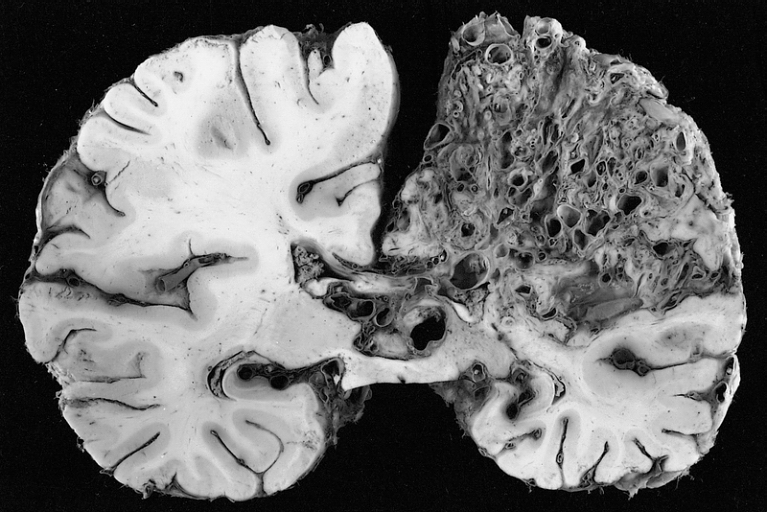Brain AVM (Arteriovenous Malformation)

Brain AVM (Arteriovenous Malformation)
Contact Us
Related Videos :
Frequently Asked Questions :
Q1: Is Brain AVM curable?
Yes, with appropriate treatment such as surgery, embolization, or radiosurgery, Brain AVMs can be effectively treated and even cured.
Q2: How do I know if I have a Brain AVM?
If you experience severe headaches, seizures, or other neurological symptoms, consult a neurologist for testing. Imaging tests like MRI or CT scans can confirm the presence of an AVM.
Q3: Can Brain AVM go away on its own?
Brain AVMs do not go away on their own. They require medical intervention to prevent complications such as brain hemorrhage.
Q4: What is the success rate of Brain AVM surgery?
The success rate of Brain AVM surgery is generally high, but it depends on factors like the AVM’s location, size, and the patient’s overall health.

About Brain AVM (Arteriovenous Malformation)
A Brain Arteriovenous Malformation (AVM) is an abnormal tangle of blood vessels connecting arteries and veins in the brain. This condition disrupts normal blood flow and can cause serious health issues. Although it is rare, AVMs can lead to severe headaches, seizures, and even brain damage if left untreated.
Causes of Brain AVM
The exact cause of Brain AVM is not known, but it is believed to be a congenital condition, meaning it is present at birth. Researchers are still studying what triggers AVM formation, but no strong genetic factors have been identified.
- Congenital condition – Often formed during fetal development.
- Genetic predisposition – Rarely linked to genetic factors.
- Environmental factors – Currently under study but not confirmed.
Types of Brain AVM
Brain AVMs can vary in size, location, and structure, leading to different types of this condition. Common classifications include:
- Parenchymal AVM – Found in brain tissue.
- Dural AVM – Involves the dura mater, the outer covering of the brain.
- Vein of Galen AVM – Affects deep brain structures and occurs in infants.
- Micro-AVM – Small, often asymptomatic AVMs.
Symptoms of Brain AVM
Brain AVMs can remain asymptomatic for years or may present with a variety of symptoms depending on their location and size. Common symptoms include:
- Severe headaches or migraines.
- Seizures or convulsions.
- Weakness or numbness in parts of the body.
- Vision problems.
- Speech difficulties.
- Confusion or memory issues.
- Sudden brain hemorrhage – A serious and life-threatening condition.
If you experience any of these symptoms, consult a doctor immediately for proper evaluation and treatment.
Diagnosis of Brain AVM
Early diagnosis of Brain AVM is critical to prevent complications. Diagnostic tests typically include:
- MRI (Magnetic Resonance Imaging) – Provides detailed images of brain structures.
- CT Scan (Computed Tomography) – Identifies bleeding in the brain.
- Cerebral Angiography – A detailed imaging test that maps the AVM’s blood vessels.
Treatment of Brain AVM
Dr. Sandeep Vaishya specializes in the latest and most effective treatments for Brain AVM. The treatment plan depends on factors like the AVM’s size, location, and the patient’s overall health. The most common treatment options include:
- Surgical Resection – The AVM is surgically removed, often recommended for accessible AVMs.
- Endovascular Embolization – A minimally invasive procedure where the AVM’s blood supply is blocked.
- Stereotactic Radiosurgery – A non-invasive technique using focused radiation beams to shrink the AVM.
- Conservative Management – Regular monitoring may be advised for small, asymptomatic AVMs.
Dr. Vaishya carefully evaluates each patient to determine the best course of action, ensuring a safe and effective treatment plan.
Cost and Stay in India for Brain AVM Treatment
India is a popular destination for Brain AVM treatment due to its world-class medical facilities and affordable care. Here’s a breakdown of the cost and stay associated with Brain AVM treatment in India:
- Treatment Cost: Brain AVM treatment in India typically ranges between $6,000 and $15,000, depending on the procedure and hospital chosen.
- Duration of Stay: Patients are usually required to stay in India for 2-3 weeks, including pre-surgery consultation, surgery, and recovery.
- Accommodation: India offers a wide range of comfortable and budget-friendly accommodation options near major hospitals.
At Dr. Vaishya’s clinic, patients receive top-tier care at a fraction of the cost compared to Western countries.